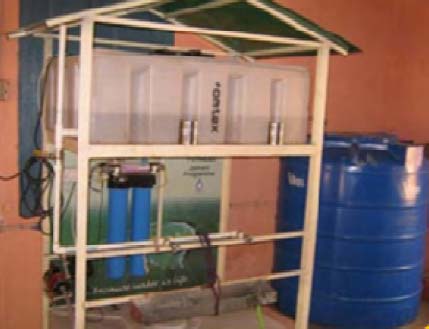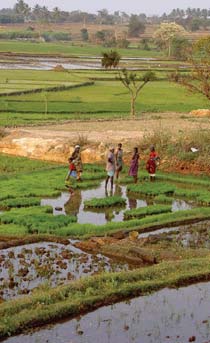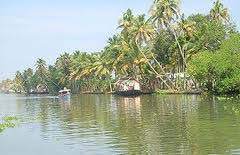/sub-categories/research-papers
Research Papers
Assessment of Jalamani programme on stand alone water purification systems in rural India - A report by Centre for Media Studies
Posted on 03 Sep, 2011 04:50 PM This report by the Centre for Media Studies, New Delhi presents an assessment of the Jalamani programme of the Department of Drinking Water Supply, Government of India. The centrally sponsored programme commenced in 2008-09 aimed at installing simple Stand Alone Water Purification Systems (SAWPS) in rural schools to enable school children to have access to safe and clean water. The focus was on tackling bacteriological contamination and turbidity in ongoing rural drinking water supply programme.
This report by the Centre for Media Studies, New Delhi presents an assessment of the Jalamani programme of the Department of Drinking Water Supply, Government of India. The centrally sponsored programme commenced in 2008-09 aimed at installing simple Stand Alone Water Purification Systems (SAWPS) in rural schools to enable school children to have access to safe and clean water. The focus was on tackling bacteriological contamination and turbidity in ongoing rural drinking water supply programme.
The assessment study used both qualitative and quantitative techniques such as focus group discussions and in-depth interviews besides structured questionnaire for a variety of stakeholders and research questions. Another important aspect of the quantitative tools was testing of the raw and treated water samples. The study was undertaken in 320 schools spread across 20 districts and six states.
Faster, sustainable and more inclusive growth – An approach to the twelfth five year plan – Draft report by Planning Commission
Posted on 03 Sep, 2011 09:28 AMThis draft report by the Planning Commission, which presents an approach to the twelfth five year plan among other things outlines some of the challenges related to agriculture, natural resources management and water resources management.
Communal toilets in urban poverty pockets - A WaterAid report
Posted on 02 Sep, 2011 12:39 PMThis report published by WaterAid describes the findings of the study conducted in seven poverty pockets in Bhopal to look at patterns of use of communal latrine facilities. Much has been invested in building communal and public toilets and more resources are likely to continue to support this form of sanitation in dense urban areas in India.
However, there is no evidence available that is needed to quantify their potential contribution to reducing open defecation and faecal pollution in these environments, and identify those design features and management factors that encourage the highest usage rates by all household members. Also there is no information available on the impact of age and gender related differences in patterns of use.
Tribal movements and livelihoods – Recent developments in Orissa – A working paper by CPRC-IIPA
Posted on 31 Aug, 2011 08:48 PMFor the last few decades and more particularly since 1990’s the issue of human rights-violation of rights to life and livelihood of tribal peoples’ is a central concern. Therefore, the discourse on tribal movements and issues of tribal livelihood revolved around securing their well-defined rights on land and forest resources.
Integrated approach to solid waste management in Pune city – A working paper in MPRA
Posted on 31 Aug, 2011 07:02 PMSolid waste is increasing in the city due to growth of population, urbanization, higher per capita income and standard of living, changing lifestyle and food habits.
The first section of the paper explains about the structure of the solid waste in the city. The solid waste according to its constituents is presented in the second section. The third section of the paper explains about the regression result. The last section deals with the policy implication and conclusion.
Social equity and integrated water resources management – A background paper by Global Water Partnership
Posted on 31 Aug, 2011 04:10 PMIt provides an analytical framework that policy makers and water professionals can use to bring greater clarity to the issue of social equity in their local context.
Groundwater quality assessment of Jharia coalfield area in West Bengal - A case study in NISCAIR
Posted on 27 Aug, 2011 06:35 PMThis case study in National Institute of Science Communication and Information Resources (NISCAIR) by the Central Institute of Mining and Fuel Research (CIMFR), Dhanbad and the Geo-Environment Division (Environment Management Group) deals with groundwater quality assessment of Jharia coalfield area of West Bengal. The physiochemical characteristics of groundwater of the upper catchments of the coalfield were studied to evaluate the water quality.
Adaptive water resource management in the Lower Bhavani project command area in Tamil Nadu – A research report by IWMI
Posted on 25 Aug, 2011 11:07 PM
To what extent farmers and water resource managers already practice adaptive management and whether it is practiced in an optimal manner or could there be areas for improvement based on recent advancements in the theory of adaptive management are some of the questions that are particularly appropriate in the light of rapid changes in river basin water use and also in relation to basin closure.
This paper draws on the development and use of water resources in the Lower Bhavani Project (LBP), with the LBP reservoir and the 84,000 hectare (ha) LBP command area. The project diverts water from the Bhavani River, a tributary of the Cauvery River in Tamil Nadu.
Water quality study and cost-benefit analysis of rainwater harvesting in Kuttanad, Kerala
Posted on 25 Aug, 2011 02:23 PM This thesis by Christina Tang for the Center of Environmental Studies, Brown University deals with a study of water quality and attempts to ascertain the net benefits or costs from rainwater harvesting under a variety of scenarios for households in various water supply conditions.
This thesis by Christina Tang for the Center of Environmental Studies, Brown University deals with a study of water quality and attempts to ascertain the net benefits or costs from rainwater harvesting under a variety of scenarios for households in various water supply conditions.
Eighty percent of the 7,00,000 citizens of Kuttanad, a region in the coastal State of Kerala have no access to clean water. In Kuttanad, intensive untreated human sewage and agricultural activities have caused severe surface water contaminations. At the same time, other sources of freshwater are unreliable for drinking: groundwater is acidic due to the soil conditions and iron leaching; freshwater from public tap is infrequent; and water supply from private vendors is extremely expensive.
Restructuring of the Central Water Commission – Ministry of Water Resources invites comments on its proposal till September 30, 2011
Posted on 25 Aug, 2011 12:24 PM
The restructuring is being proposed primarily to adopt river basins as the fundamental block for integrated planning, development and management of water resources in the country.